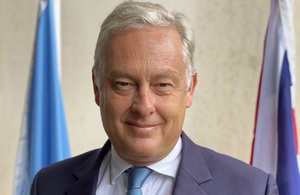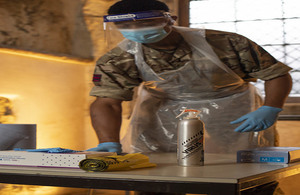Experts from India and the UK will join forces through a new virtual hub to deliver vaccines for coronavirus and other deadly viruses, the UK Foreign Secretary Dominic Raab announced in India today (Wednesday 16 December).
The Foreign Secretary met Prime Minister Modi to discuss the UK and India working together as a force for good and launching the pioneering new vaccines hub which will share best practice for regulation and clinical trials, and foster innovation. He also visited a Delhi health clinic where Oxford/AstraZeneca vaccines will be administered.
India’s Serum Institute is poised to make over a billion doses of the coronavirus vaccine developed by Oxford University and AstraZeneca. Unlike other vaccines, it can be stored at normal fridge temperatures, making it easier and cheaper to produce and keep – and distribute around the world.
Foreign Secretary Dominic Raab said:
This Serum Institute and Oxford University partnership demonstrates the UK-India relationship at its best: a vaccine developed in the UK and made in India, drawing our brightest minds together to save lives as a global force for good.
A global pandemic requires a global solution. Scientific cooperation has made breakthroughs on coronavirus vaccines at record-breaking pace and the UK-India Vaccine Hub will now build on these innovations, to bring this crisis to an end and protect us all against future pandemics.
Millions of the doses made by the Serum Institute will be distributed to the world’s poorest people via the global COVAX initiative, in partnership with the World Health Organization (WHO) and Gavi, the vaccine alliance.
The UK has championed equitable access to any coronavirus vaccine for those who need it and has committed up to £619 million to COVAX to secure both the UK’s access to coronavirus vaccines and distribute Covid-19 vaccines across the world.
India supplies more than 50% of the world’s vaccines and 25% of the NHS’s generic drugs. Closer UK-India cooperation on medicines and vaccines approvals will ensure speedy access for the UK to Indian-produced pharmaceuticals and help safeguard future supplies to the NHS.
The new hub will enable British and Indian experts to share knowledge on clinical trials and regulatory approvals and get vaccines to people who need them most in a safe, secure and energy-efficient way.
It will protect the UK and India by enhancing cooperation on the development and distribution of coronavirus vaccines, better aligning the international regulation of vaccines and fostering partnerships to develop innovation ‘moonshots’ that can define vaccine delivery over the next decade and beyond.
During his meeting with Prime Minister Modi today, the Foreign Secretary signalled his ambition for a closer UK-India relationship as part of a wider UK focus on our partnerships in the Indo-Pacific. They also spoke about the 10-year roadmap which heralds a new era for the UK and India with an ambitious plan for an Enhanced Trade Partnership.
The Foreign Secretary also met Minister for Education Ramesh Pokhriyal and agreed to work together on mutual recognition of academic qualifications, starting with master’s degrees, over the next year.
The Foreign Secretary welcomed the signing of a new agreement between the University of Edinburgh and the Indian State of Gujarat to open a new biotechnology university in Gujarat in July 2021. This will be the first foreign university collaboration of its kind in India.
Notes to editors
- The UK is one of the biggest global funders of the World Health Organization and the single biggest donor to the Coalition for Epidemic Preparedness (CEPI) and to Gavi.
- Of the £619 million the UK has committed to COVAX, a global initiative designed to provide countries equitable access to safe and effective vaccines, up to £548 million will go towards helping developing countries get coronavirus vaccines to those who need them. COVAX is co-led by Gavi, CEPI and WHO.
- The UK and India also announced today a new memorandum of understanding between India’s Central Drugs Standard Control Organisation (CDSCO) and the United Kingdom Medicines and Healthcare Products Regulatory Agency (UK MHRA) agreeing to more frequent discussions on UK-India vaccine and pharmaceutical regulations, improving standards and sharing information to control against the trade of unlicensed products.
- In addition, the UK and India announced a new partnership to help UK and Indian scientists unlock the power of data, including the data within our genes, to deliver better diagnostics and enhanced life-saving treatments for cancer, diabetes, maternal health challenges and rare diseases.
- Free-to-use photos from the Foreign Secretary’s visit to India are available to download here.


